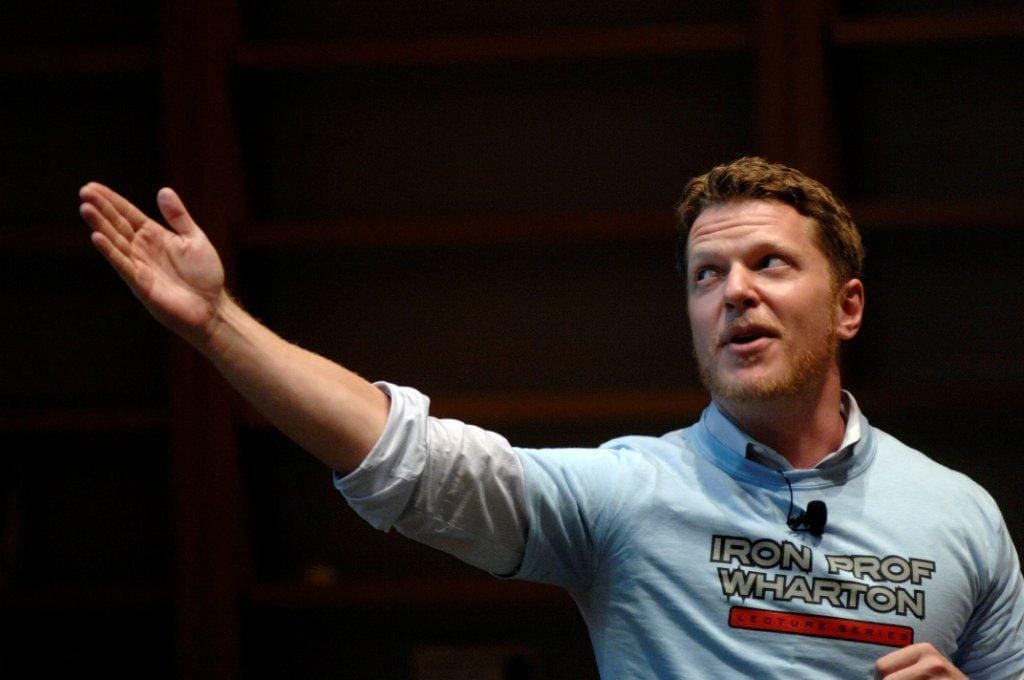Like any “reality” show with audience participation, voting at Iron Prof is unpredictable. It was anyone’s game at the third annual event, held before an overcapacity crowd in Huntsman Hall in early April.
The event is designed to mimic the popular TV series Iron Chef. The Wharton twist is that professors put together a five-minute presentation summarizing their latest research and then sell the idea to the audience. Attendees then vote by cellphone to give a professor the coveted Iron Prof title.

Wharton’s CIBC Endowed Professor and Vice Dean of Innovation Karl Ulrich during his pitch at the third annual Iron Prof. Photo credits: Alyssa Cwanger.
I won’t tell you who I thought would win—I was wrong—but I will let you wait until the end of this blog to simulate the anticipation of the live event (sort of).
Judd Kessler, assistant professor of business economics and public policy, went first in the 2013 Iron Prof competition and presented research about decision-making and incentives for organ donation. Kessler co-authored his study with Nobel Prize winner Alvin E. Roth, so he must be Iron Prof material, right? They looked at the effects of government programs that allow donors to receive priority access to organs should they end up needing them, as well as “loopholes” that allow declared donors to avoid donating after death if a medical professional vetoes it.
Best known for his research on innovation tournaments, Wharton’s CIBC Endowed Professor and Vice Dean of Innovation Karl Ulrich followed Kessler with a presentation on the value of a raw, innovative idea. A good one, it turns out, is worth a lot.
“I will tell you how to get love, happiness and money,” was how Ethan Mollick started his five-minute pitch.
According to the Edward B. and Shirley R. Shils Assistant Professor of Management, who interviewed 30,000 alumni in a study on work-life balance, the answer is: entrepreneurship.
Presenting in the fourth slot, Assistant Professor of Finance Alex Edmans provided evidence that stock markets are driven by emotion, not fundamentals. His proof is the World Cup. Since 1973, when a nation’s team has lost a World Cup semi-final match, that country’s stock market dropped on average 0.5 percent the next day.
“When team USA loses [a soccer match], the market actually goes up the next day,” he quipped.
Katherine Milkman, an assistant professor of operations and information management, built off two popular-culture phenomena for her presentation: the Hunger Games book series (and movie) and Liz Lemon, the heroine (roughly defined) of the TV show 30 Rock. In the show, Lemon often moans about not going to the gym while eating junk food. Milkman and colleagues modeled a study at Penn’s Pottruck gym to see what would happen if students bundled their temptations—in this study’s case, “page-turning” audio books like Hunger Games—with beneficial activities like exercise. The findings suggest that exercisers (61 percent of students in the study) would even pay to have access to the audio books at the gym.
 The last contestant, Michael Sinkinson, assistant professor of business economics and public policy, pitched his analysis of wireless provider contracts—specifically, exclusive contracts that providers form with smartphone manufacturers, such as AT&T’s partnership with Apple and the early iPhones. One finding is that exclusive contracts can benefit everyone (manufacturers, providers and competitors) in certain circumstances.
The last contestant, Michael Sinkinson, assistant professor of business economics and public policy, pitched his analysis of wireless provider contracts—specifically, exclusive contracts that providers form with smartphone manufacturers, such as AT&T’s partnership with Apple and the early iPhones. One finding is that exclusive contracts can benefit everyone (manufacturers, providers and competitors) in certain circumstances.
If you guessed that Kessler, or Ulrich, or Mollick, or Edmans, or Sinkinson won, you would be wrong. This year’s Iron Prof is: Katherine Milkman. Congratulations, Iron Prof Milkman!

























